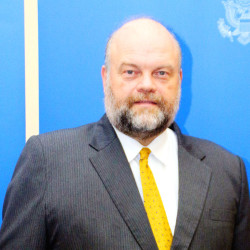The Arbitral Award of 1899 settling the Guyana/Venezuela boundary should be respected, according to newly-accredited US Ambassador to Guyana Perry Holloway, who yesterday stressed that peaceful means consistent with international law should be used to settle the ongoing controversy between the two countries.
“We call on all parties to continue to respect the 1899 arbitral ruling and boundary unless or until a competent legal body decides otherwise or both parties agree on something else,” Holloway told a press conference at the US Embassy, in Kingston, in response a question on US’s position on the award in light of the controversy.

Holloway’s recognition of the validity of the arbitral award and the boundary between the two countries also came in the wake of former Speaker of the National Assembly Ralph Ramkarran’s recent criticism of the US’ “wholly inadequate and inexplicable” position on the controversy.
Ramkarran, writing on his blog over the weekend, urged Washington to urgently review its position and acknowledge the validity of the boundary, particularly in light of its pivotal role in determining the border.
Ramkarran recalled that US Charge d’Affaires Bryan Hunt, in defining the US position on the matter on July 9, had limited his comments to the Geneva Agreement. He argued that as a result of the US referencing only half the story and omitting mention of the 1899 Arbitral Award, Venezuela’s argument that the current borders are a colonialist imposition can attract sympathy and justify its aggressive behaviour.
“The US’s silence hinders Guyana in representing its case to the wider world because the position that the US takes influences other countries. Yet the US is tip-toeing around Venezuela,” Ramkarran noted.
Holloway, at his first press conference since he presented his credentials last Friday, reminded that the land boundary was decided by the arbitral award and duly implemented by both parties until decades later, when Venezuela stated its intention to challenge the validity of the award.
Tensions began escalating earlier this year after Venezuela President Nicolás Maduro issued a decree laying claim to a vast section of Guyana’s maritime territory, inclusive of an area where a significant amount of oil had been found.
About two weeks ago, there was a noticeable buildup of troops near the Guyana/Venezuela border and armed boats in the Cuyuni River, which falls within Guyana’s territory. Venezuela later withdrew the troops, while saying they were deployed as part of an anti-narcotics operation.
Holloway also reiterated that the ongoing controversy should be settled through peaceful means that are consistent with international law. He said it is important that both sides avoid “any actions that could complicate the ongoing efforts to meet a diplomatic solution.” He further noted that the US government is pleased that the presidents of the two countries recently met with UN Secretary General Ban Ki-moon and urged that they continue the dialogue.
President David Granger has been using every opportunity to lobby for international support for Guyana’s territorial integrity and to resolve the controversy once and for all through a judicial settlement.
Asked to clarify whether the US would get physically involved in any confrontation that would arise out of the controversy, he repeated that his government’s position is to encourage both sides to try to address the boundaries through diplomatic means and to not do anything that “could sort of raise the concerns of one side or the other.
“As far as do we intervene or how do we support? Each situation is different and the circumstances that may bring about a situation… everything is obviously evaluated on a case by case basis but right now our focus is on peaceful resolution, continued dialogue and respect for international law,” he added.
Responding to a question on the US government’s interest in the matter, particularly since a US-based company is at the centre of the controversy, he told reporters that there are two different issues of concern in this respect.
First, he said, the US government feels that boundary disputes should be resolved through peaceful and diplomatic means, with respect for international law. “At the same time, we do have a policy of ensuring that US company’s rights are protected under international laws or under the law of a given country that they are operating in and we are entrepreneurial capitalistic country in certain aspects, so we do support our US companies.
But we expect our US companies to comply with international law and norms. So, I don’t think whether it was a US company or a Chinese company… I don’t thing that that would dramatically change our view on the current dispute going on,” he added.
ExxonMobil had announced that it had found significant quantities of hydrocarbons in its Stabroek Block in Guyana’s territorial waters. The 23,000 square kilometres of the Stabroek Block is located within the area into which the new territorial claim is now extended.





